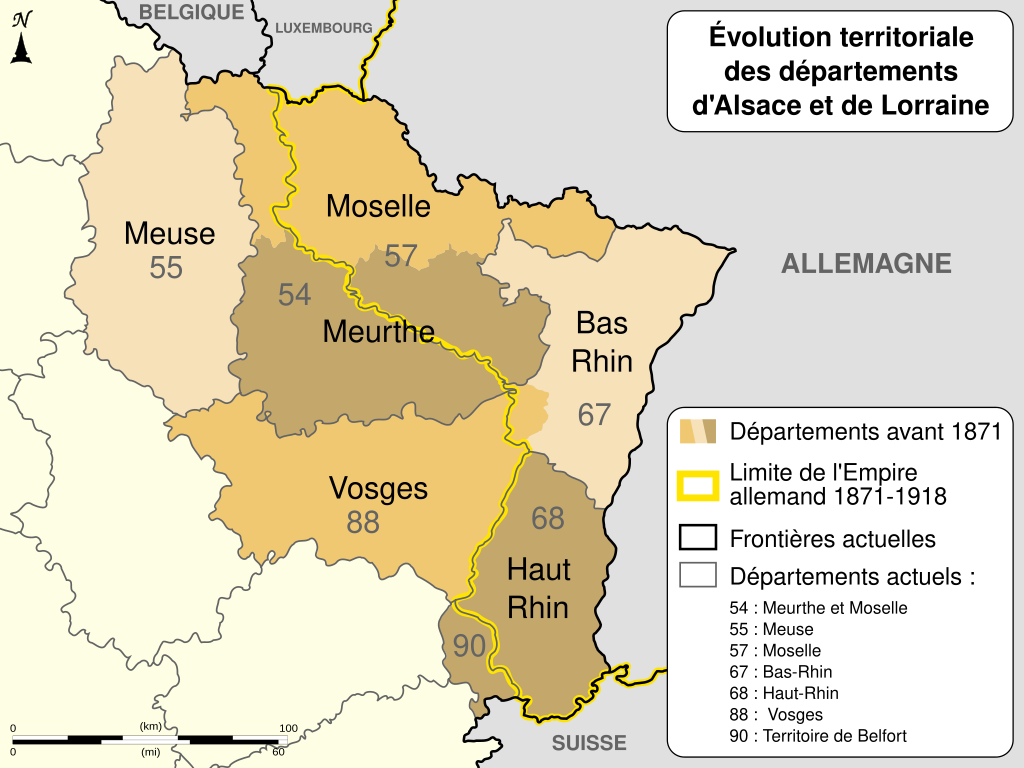The state of Michigan exists on both sides of the great lakes (which are effectively freshwater oceans, containing their own maritime economies, marine salvage operations, maritime weather and even famous lost ships) so there’s the Michigan mainland which contains major cities like Detroit, Lansing, Ann Arbor and Grand Rapids, but then there’s the “upper penninsula” which is heavily wooded and some consider a continuation of the “north woods” of Wisconsin. Map for context:
As promise, here is the explanation for the split in Lorraine: Lorraine is a region in easter France that is culturally split in two. One part is of Frank culture, like Paris and French tradition, the other as a culture much closer to Germany, Luxembourg and german speaking countries. It also as a germanic tradition as local languages used to be some german dialect rather that french dialect.
This part of Lorraine which is roughly the Moselle county used to be called germanic Lorraine but this term started to be ambiguous when France lost Alsace, the very famously german-cultured region at the border of France and Germany, and the Moselle county in 1871.
After the great war, Alsace-Moselle was part of France again, but as some of its social laws where better than France at the time, it was decided to keep them in place and not to apply the laws that where voted in France when it was part of German. Because of that, today Lorraine is separated not only culturally but also by laws in place. Go to Metz, on the germanic part, and have two more non-work holiday as in Nancy in the french. In Nancy and Metz, social contributions are calculated differently and important laws for France are not applied no the german side : Church and State are not separated there.
Of course, French State work on every day following that law but in Moselle and Alsace, men of worship can be pay with public money.
All that with having Nancy and Metz separated by 50 km and both being part of Lorraine.
The state of Michigan exists on both sides of the great lakes (which are effectively freshwater oceans, containing their own maritime economies, marine salvage operations, maritime weather and even famous lost ships) so there’s the Michigan mainland which contains major cities like Detroit, Lansing, Ann Arbor and Grand Rapids, but then there’s the “upper penninsula” which is heavily wooded and some consider a continuation of the “north woods” of Wisconsin. Map for context:
Thanks.
As promise, here is the explanation for the split in Lorraine: Lorraine is a region in easter France that is culturally split in two. One part is of Frank culture, like Paris and French tradition, the other as a culture much closer to Germany, Luxembourg and german speaking countries. It also as a germanic tradition as local languages used to be some german dialect rather that french dialect.

This part of Lorraine which is roughly the Moselle county used to be called germanic Lorraine but this term started to be ambiguous when France lost Alsace, the very famously german-cultured region at the border of France and Germany, and the Moselle county in 1871.
After the great war, Alsace-Moselle was part of France again, but as some of its social laws where better than France at the time, it was decided to keep them in place and not to apply the laws that where voted in France when it was part of German. Because of that, today Lorraine is separated not only culturally but also by laws in place. Go to Metz, on the germanic part, and have two more non-work holiday as in Nancy in the french. In Nancy and Metz, social contributions are calculated differently and important laws for France are not applied no the german side : Church and State are not separated there.
Of course, French State work on every day following that law but in Moselle and Alsace, men of worship can be pay with public money.
All that with having Nancy and Metz separated by 50 km and both being part of Lorraine.
neat, thanks!